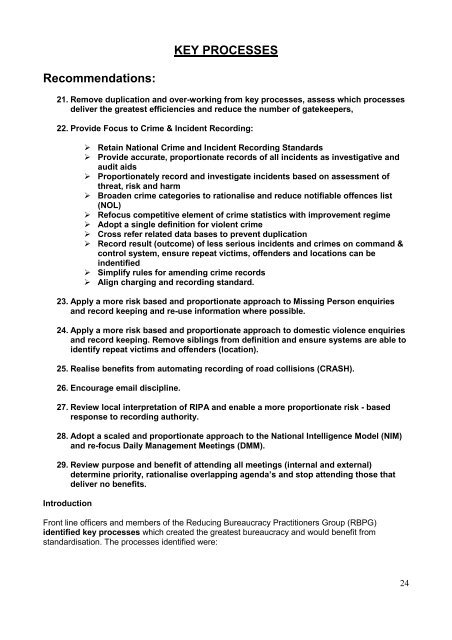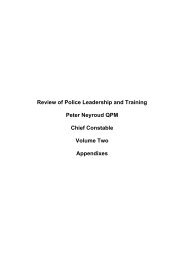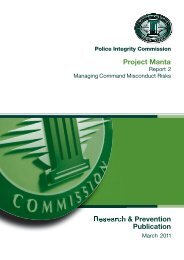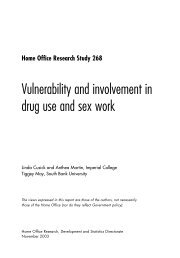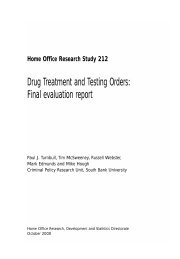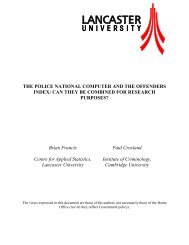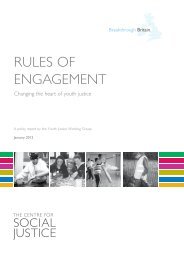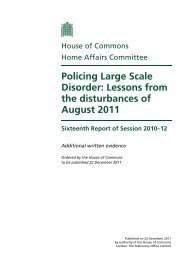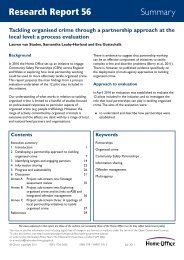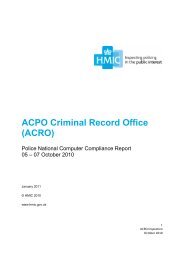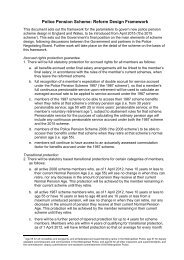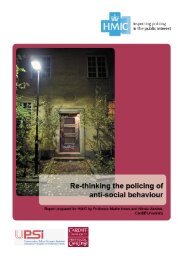Reducing Bureaucracy in Policing - Home Office
Reducing Bureaucracy in Policing - Home Office
Reducing Bureaucracy in Policing - Home Office
Create successful ePaper yourself
Turn your PDF publications into a flip-book with our unique Google optimized e-Paper software.
Recommendations:<br />
KEY PROCESSES<br />
21. Remove duplication and over-work<strong>in</strong>g from key processes, assess which processes<br />
deliver the greatest efficiencies and reduce the number of gatekeepers,<br />
22. Provide Focus to Crime & Incident Record<strong>in</strong>g:<br />
� Reta<strong>in</strong> National Crime and Incident Record<strong>in</strong>g Standards<br />
� Provide accurate, proportionate records of all <strong>in</strong>cidents as <strong>in</strong>vestigative and<br />
audit aids<br />
� Proportionately record and <strong>in</strong>vestigate <strong>in</strong>cidents based on assessment of<br />
threat, risk and harm<br />
� Broaden crime categories to rationalise and reduce notifiable offences list<br />
(NOL)<br />
� Refocus competitive element of crime statistics with improvement regime<br />
� Adopt a s<strong>in</strong>gle def<strong>in</strong>ition for violent crime<br />
� Cross refer related data bases to prevent duplication<br />
� Record result (outcome) of less serious <strong>in</strong>cidents and crimes on command &<br />
control system, ensure repeat victims, offenders and locations can be<br />
<strong>in</strong>dentified<br />
� Simplify rules for amend<strong>in</strong>g crime records<br />
� Align charg<strong>in</strong>g and record<strong>in</strong>g standard.<br />
23. Apply a more risk based and proportionate approach to Miss<strong>in</strong>g Person enquiries<br />
and record keep<strong>in</strong>g and re-use <strong>in</strong>formation where possible.<br />
24. Apply a more risk based and proportionate approach to domestic violence enquiries<br />
and record keep<strong>in</strong>g. Remove sibl<strong>in</strong>gs from def<strong>in</strong>ition and ensure systems are able to<br />
identify repeat victims and offenders (location).<br />
25. Realise benefits from automat<strong>in</strong>g record<strong>in</strong>g of road collisions (CRASH).<br />
26. Encourage email discipl<strong>in</strong>e.<br />
27. Review local <strong>in</strong>terpretation of RIPA and enable a more proportionate risk - based<br />
response to record<strong>in</strong>g authority.<br />
28. Adopt a scaled and proportionate approach to the National Intelligence Model (NIM)<br />
and re-focus Daily Management Meet<strong>in</strong>gs (DMM).<br />
29. Review purpose and benefit of attend<strong>in</strong>g all meet<strong>in</strong>gs (<strong>in</strong>ternal and external)<br />
determ<strong>in</strong>e priority, rationalise overlapp<strong>in</strong>g agenda’s and stop attend<strong>in</strong>g those that<br />
deliver no benefits.<br />
Introduction<br />
Front l<strong>in</strong>e officers and members of the <strong>Reduc<strong>in</strong>g</strong> <strong>Bureaucracy</strong> Practitioners Group (RBPG)<br />
identified key processes which created the greatest bureaucracy and would benefit from<br />
standardisation. The processes identified were:<br />
24


